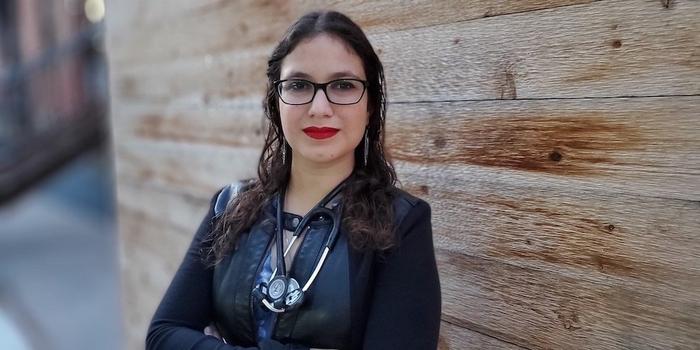
You never forget your first childhood pet, be it a puppy, a kitten, or even a goldfish. Elizabeth Markovich vividly remembers hers, a St. Bernard named Monya, which her family got when she was 8, soon after they moved to the U.S. from Israel. The dog was more than just a companion—he would go on to inspire Markovich to become a veterinarian.
“When he turned 6, he developed acute kidney failure,” she says. “My parents didn’t speak English and my older sister had gone away to college, so at 14 years old, I became the main interpreter and was in charge of his medications and treatment.” Markovich was responsible for giving Monya fluids before school and after finishing her homework. “Unfortunately, he did not survive, but this set me on my long and winding road to veterinary medicine,” she says.
Today, she’s a student at the University of Minnesota’s College of Veterinary Medicine. She has also completed two Student Job Programs through Banfield Pet Hospital, a general veterinary practice focused on preventive care with more than 1,000 hospitals nationwide. She also serves as a student ambassador for the company and educates other students on Banfield’s different student programs.
Here, Markovich—who currently has two St. Bernards, Adon and Manya—shares the benefits of working at Banfield, career advice for others who want to be vets, and why you should never undervalue your work.
Tell us about Banfield Pet Hospital’s Student Job Program. What attracted you to it?
I have done the Student Job Program at Banfield two summers in a row. The program is for veterinary students who are in their first through third years, and it allows students to hone their basic clinical skills by working as a vet assistant 75% of the time and working alongside a doctor the other 25%. I loved that it offered practical clinical skills, which is great since veterinary students don’t always have a lot of in-class opportunities. It helped me truly build the confidence I needed to take charge. I was also exposed to the flow of a clinic from the perspective of the doctor and it allowed me to work with patients.
What stands out about working at Banfield Pet Hospital?
Banfield offers a 12-week onboarding program for all new incoming doctors before starting full-time positions at the hospital. This is wonderful as it allows new graduates to get their footing, which is so important. New graduates also get paid their regular rate during the program. Banfield supports students in their financial well-being and work-life balance, and helps prepare them to be a doctor.
What do you love most about your role as a student ambassador for Banfield Pet Hospital?
Prior to the pandemic, I loved planning lunch-and-learns to educate students and being one of the point people on campus for any Banfield-related questions. There are so many clinics out there and school is stressful enough without having to independently research places to work after graduation. I love being able to bring opportunities to people and help relieve at least some of the burden.
What makes you want to work at Banfield Pet Hospital after you graduate?
I love the flexibility in terms of location. I know that Banfield will support me moving to a new town or even state if that’s where life takes me. I don’t have to look for a new job and sit through a bunch of interviews at clinics where I have to learn a whole new system if my partner gets an opportunity in California, for example. I would just have to apply for a transfer.
I also love the flexibility Banfield offers with scheduling! I have the opportunity to work full time and receive full-time benefits while only working four days per week. I know it may not be for everyone, but I would rather work a few extra hours per day and have three days off every week.
Lastly, I love that I have an established company that has my back and will help take care of the business side of things. Lots of people have asked me about whether or not I would want to have my own clinic when I graduate and, while I respect those that choose to do so, I went into veterinary medicine to be a doctor. I don’t want to think about the admin side of things. Banfield will allow me to just focus on working with my hospital team to provide care to pets and their owners.
How does Banfield support learning and development?
Continuing education (CE) is so important in the ever-changing and evolving field of veterinary medicine. Banfield offers specific time off and a budget for CE so doctors don’t have to choose between a vacation or continuing education.
What advice do you have for those thinking of pursuing a career in veterinary medicine?
It is a long and tough road. You have to be committed because you will fail and make mistakes—that’s just human. But if it is your passion, you can’t give up! The work is so rewarding, and getting to live out our passion for caring for pets every day makes it all worth it.